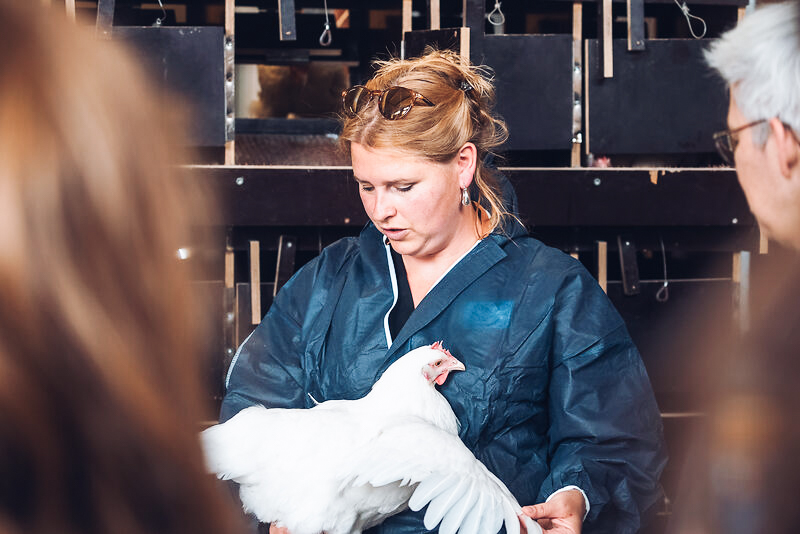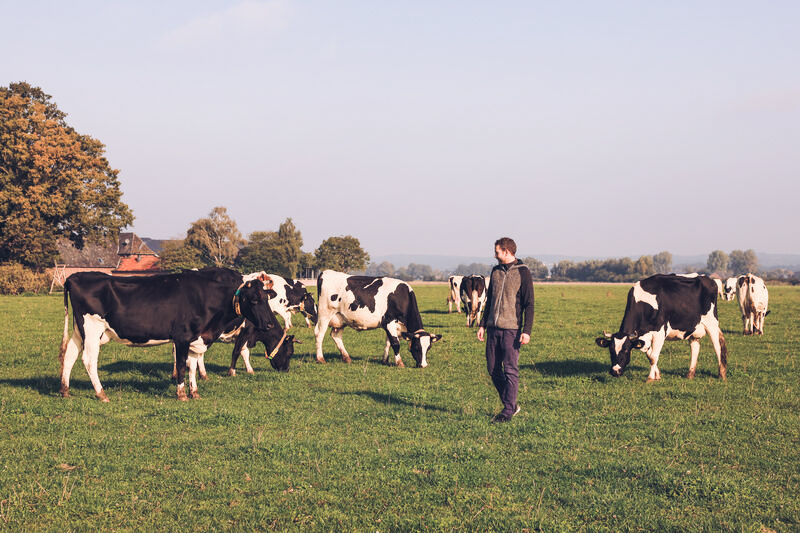Foto: Tom Schäfer
“The path slips under the feet of the walker.”
Since our foundation in 2015, we have seen this sentence by Martin Walser (from the poem Courage) come true on a daily basis. Emerging from a series of external circumstances and special events, we have gradually established a sustainable and forward-looking structure in the field of organic animal husbandry.
We have faced challenges, always found new ways forward and have always made progress. Driven by passionate commitment and a clear vision for better animal husbandry, we have continued to develop and can now look back on significant milestones:
In the 1990s, organic poultry farming was still in its infancy. Cage farming was the sad standard and most laying hens barely had room to breathe. The first guidelines for organic farms had only just been developed and the idea of organic broilers was nothing but an illusion. But as demand for organic food grew, more and more farms realised that things could not go on like this.
In 2013, things got really serious. The public gained a shocking insight into the abuses in livestock farming. Reports of unacceptable conditions and feed fraud, including on organic farms, were published. These incidents showed that the way in which animals are bred, kept and fed is fundamentally flawed.
In particular, the breeding of animals that either grow quickly and produce a lot of meat or lay large quantities of eggs was criticized, as it requires an intensive supply of nutrients and entails many animal welfare issues. It became clear: if we are serious about organic, we need to rethink. Urgently. Animal breeding and husbandry must go hand in hand. They need to be more environmentally friendly, sustainable and fair for everyone!
As a result, the poultry farmers of the Demeter and Bioland organic associations agreed: if you want to change things, you have to invest in your own, independent organic breeding programme! But this was anything but easy. Worldwide, there was no longer a freely accessible gene pool with a sufficient breeding history and genetic range - everything was already privatised and owned by companies.
But then we came across a real treasure: old breeding stock from the GDR. Scientists at the University of Halle had kept these valuable animals with decades of breeding history for research purposes - not for trade. The pioneers Dr Sigmar Götze and Jörg Bourget had already selected these animals at the University of Halle in Merbitz in 1994. And as luck would have it, they were ready for a new home in 2014. A real stroke of luck!
In 2015, Bioland and Demeter founded a non-profit limited company with the aim of promoting organic animal breeding and launching an innovative breeding programme for laying hens.
Unter der Geschäftsleitung von Inga Günther-Bender wurde mit zwei Herden der Hühnerrassen White Rock und New Hampshire der neue Zuchtstandort der ÖTZ in Goch / Nordrhein-Westfalen eingerichtet. Diese Tiere bilden nun die Grundlagen unserer Zuchtarbeit.
Two years later, a third herd of the meaty French breed Bresse Gauloises added to the genetic diversity of our breed.
Schon vor der Gründung der ÖTZ hatte Inga Günther-Bender begonnen diese Tiere zu Hause am Bodensee zu selektieren. Sie waren die perfekte Ergänzung zu den bereits vorhandenen Rassen White Rock und New Hampshire.
A new milestone in organic poultry breeding: At the beginning of 2019, the ÖTZ crosses ‘Coffee’ and ‘Cream’, named after the colours of their plumage, were presented to farmers for the first time. At the same time, ÖTZ has continued to specialise in the pure breeding of ÖTZ Bresse Gauloise.
A new chapter began in November 2020 with the introduction of the cattle breeding sector. Cattle farming, an essential part of organic farming, now also received the necessary attention at ÖTZ. Dr Carsten Scheper has been responsible for this area ever since.
In 2025, we will be celebrating our tenth anniversary - a decade full of commitment, innovation and passion for organic livestock farming and greater animal welfare in agriculture in general.
But that is just the beginning!
Further breeds and livestock species are to be included under the ÖTZ umbrella in the future. At the same time, we will continue our intensive research and breeding and offer comprehensive information and support for our customers in order to further advance our vision of independent farming structures, biodiversity, climate-friendly and sustainable livestock farming.
Fotos: Dr. Carsten Scheper | ÖTZ; Maxi Strauch; Miriam Tacke | ÖTZ; Benhoefer | Pixabay

In 2017, we introduced a customized transponder-supported drop nest control. This enables us to record each egg individually, assign it to the hen and assess it according to size, shell stability, shape, etc. At the same time, the drop nest control enables us to observe the animals precisely and helps to optimise their welfare.
The principle is simple: the hen enters a nest, which is sealed by a mechanism for the duration of egg laying. After laying, the egg rolls out. The hen is registered by a transponder and is allowed to return to the flock.
Usually breeding stockElterntiere (im Kontext der Tierzucht) sind speziell ausgewählte Tiere, die zur Fortpflanzung eingesetzt werden, um genetische Merkmale gezielt an die Nachkommen weiterzugeben. Sie bilden die Basis für die Züchtung von Tieren mit gewünschten Eigenschaften, wie etwa hoher Leistung, Gesundheit, Robustheit oder spezifischen Merkmalen. Merkmale von Elterntieren: Einsatz in der Zucht: Elterntiere können in verschiedenen Zuchtprogrammen verwendet werden, z. B. in der Reinzucht oder Kreuzungszucht. Gezielte Auswahl: Elterntiere werden nach bestimmten Kriterien ausgewählt, wie genetischer Vielfalt, Fruchtbarkeit, Gesundheit oder Leistung. Genetische Weitergabe: Sie tragen die Gene, die in einer Zuchtlinie oder Population verstärkt werden sollen. is kept in single cages to collect this performance data. We are proud that we are able to use modern technology and data processing systems to collect the necessary data and at the same time give the animals access to exercise, fresh air and their own species-specific behavior.
In 2018, we linked the manual drop nest control with a new database. This individual software enables us to precisely record all animal and breeding-relevant data, which significantly improves our breeding processes and optimizes the basis for breeding value estimation.
Breeding chickens and their hatching eggs are subject to strict hygiene regulations, as their offspring are kept on numerous farms. As the only organic-certified poultry breeding company in the world, we have developed a comprehensive hygiene concept that meets the high requirements for closed housing systems, but which must function with a green outrun.
Without this hygiene concept, deliveries of hatching eggs to other EU countries or to larger domestic farms would not be possible
ÖTZ is the only breeding company in the world with breeding animals in a green run and 100% organic feed. We were able to certify the naturally grown forest adjacent to the breeding stables as an outdoor run, which our chickens are particularly happy about as they originally live on the edge of the forest. The animals feel safe under trees and bushes and find natural sandy bathing areas as well as roots and insects to enrich their diet.
As part of the Öko2Huhn project, we have been holding an annual two-day online expert forum since 2022. The focus is on current issues relating to the breeding, keeping, feeding and marketing of dual-purpose chickens. The topics are examined from both a scientific and a practical perspective.
The high quality of the contributions and recordings (not only in terms of content) is remarkable, as we stream the forum from a studio in Leipzig.
All contributions will be recorded and are freely available to interested parties.

In 2021, we founded an advisory board for ÖTZ cattle breeding, which consists of experienced farmers, consultants and scientists. This advisory board supports us with valuable knowledge and expertise to further develop our cattle breeding.
In 2022 we established our first expert forum for organic cattle breeding, at which the first expert contributions and findings were presented. This marked an important step in networking and knowledge transfer within the industry.
In Augsut 2023 we introduced the " RZÖkoRZÖko stands for Organic Relative Breeding Value in the Holstein-Schwarzbunt and Holstein-Rotbunt breeds. The RZÖko is an overall breeding value that weights the individual traits it contains (e.g. longevity or body condition) and trait complexes (e.g. the complex of health traits in the RZGesund) in the sense of an ecological breeding goal. It thus serves both breeding organizations and practical breeders as a direct selection tool for the systematic realization of an ecological breeding goal. It is comparable to the ÖZW in the Fleckvieh and Braunvieh breeds. " the first ecological characterized overall breeding value for the German Holstein breed (Black and Red Holsteins). The breeding value developed by the ÖTZ in cooperation with the German Beef and Pig Association (BRS) and is an important milestone for the development of the ÖTZ cattle breeding sector and organic cattle breeding itself.

versandkostenfrei
Bruteier bestellen bis zum 4. Advent
Mit dem Code
XMAS25
You are currently viewing a placeholder content from Vimeo. To access the actual content, click the button below. Please note that doing so will share data with third-party providers.
More InformationYou are currently viewing a placeholder content from YouTube. To access the actual content, click the button below. Please note that doing so will share data with third-party providers.
More InformationYou need to load content from reCAPTCHA to submit the form. Please note that doing so will share data with third-party providers.
More InformationYou are currently viewing a placeholder content from Google Maps. To access the actual content, click the button below. Please note that doing so will share data with third-party providers.
More Information